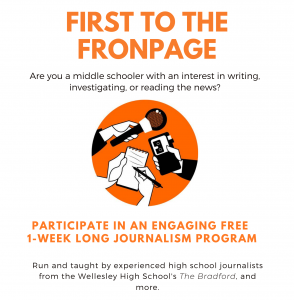From Student To Teacher
What a summer journalism course has taught me about teaching and working on the thing I love most.

Over the past two weeks I have been teaching journalism to young and aspiring middle school journalists. The program I taught was a student-run and student-established course called: First to the Frontpage, created in the Summer of 2020 by Wellesley High School students Suzie Kim (’23), Ian Lei (’21), and Felipé Lopez (’22). Their first summer teaching was my first summer learning.
At first, journalism seemed intimidating to me. There was so much to write and report about. The mentors I had threw information at me left and right. Journalism itself sounded so different from the creative writing and argument writing I had known. And to be frank, I thought the only forms of journalism out there were newspapers talking about politics or two people sitting in front of a huge television screen reading off a paper script. Honestly, sitting in front of my computer that summer, I couldn’t imagine myself as a journalist, not even one, but five years into the future. When I opened the doors to the world of reporting, I peeked my head instead of striding in like some peers. But as a student and even as a journalist, it’s important to step out of your comfort zone. Whether that be reporting stories that are tough to write about, ones that require more research, or even having to sit through long and boring conference meetings. As learners we have lots to figure out and improve on.
Even teachers are still students. That was one thing I learned while teaching this summer. Little details mattered a lot more than I thought. There had been points and tips I had missed even as a writer which I realize now are crucial to the structure and layout of a piece. My students at times were confused, but that got me to take a different approach in teaching the lesson in a different style. A form for which middle school students would understand– also keeping in mind that I shouldn’t overload them with work.
As Albert Einstein more or less said: “If you can’t explain it simply, then you don’t understand it well enough.” Now this quote applied specifically to my teaching because I tended to go on long tangents explaining curriculum and giving advice. This didn’t give the students enough time to digest the feedback and information they were receiving. In the future, I strive to make my explanations more condensed as well as giving the students room to write by themselves instead of me leading them every step of the way.
On a more daily basis, the program would work on building a news article– focusing on one key aspect every day until a sandwiched story was created. This included skills such as working in quotations, interview skills, the structure of each article– ultimately working up to their final project of writing their own news story, an opinion or feature.

Over the course of these two weeks our efforts were not without struggle. The first session went pretty well with packed classes and heavily engaged writers. That wasn’t to say there were no difficulties reaching out to interviewees who had tight schedules or who simply just didn’t respond. But by making quick changes and finding a solution without altering the course of the story was good practice, even as a learning journalist myself. Making these tough transitions and finding a solution fast when a story idea is taken or when elements fall apart is something we as writers and teachers need to grasp.
The second session this summer had only two students. Although their learning was more personalized, receiving feedback sooner, the environment was less engaging and the community of writers who could peer edit and learn together was restricted.
Through these two weeks I have indeed learned more as a journalist and teacher. Knowing how to lead classes, provide focused feedback, make quick and easy changes to a story, and hand down the knowledge I have for one of my passions. It was a great learning experience for my co-workers and I as well as the students. I hope to continue teaching at similar programs so that I can pass down what I learn to younger students as I work on becoming a better journalist myself.
P.S. If you are interested in the course I taught at, First to the Frontpage, please email us at: firsttothefrontpage@gmail.com. Our website is located at: https://firsttothefrontpage.weebly.com/